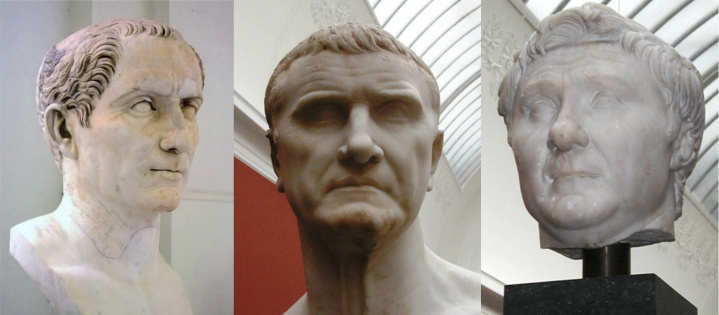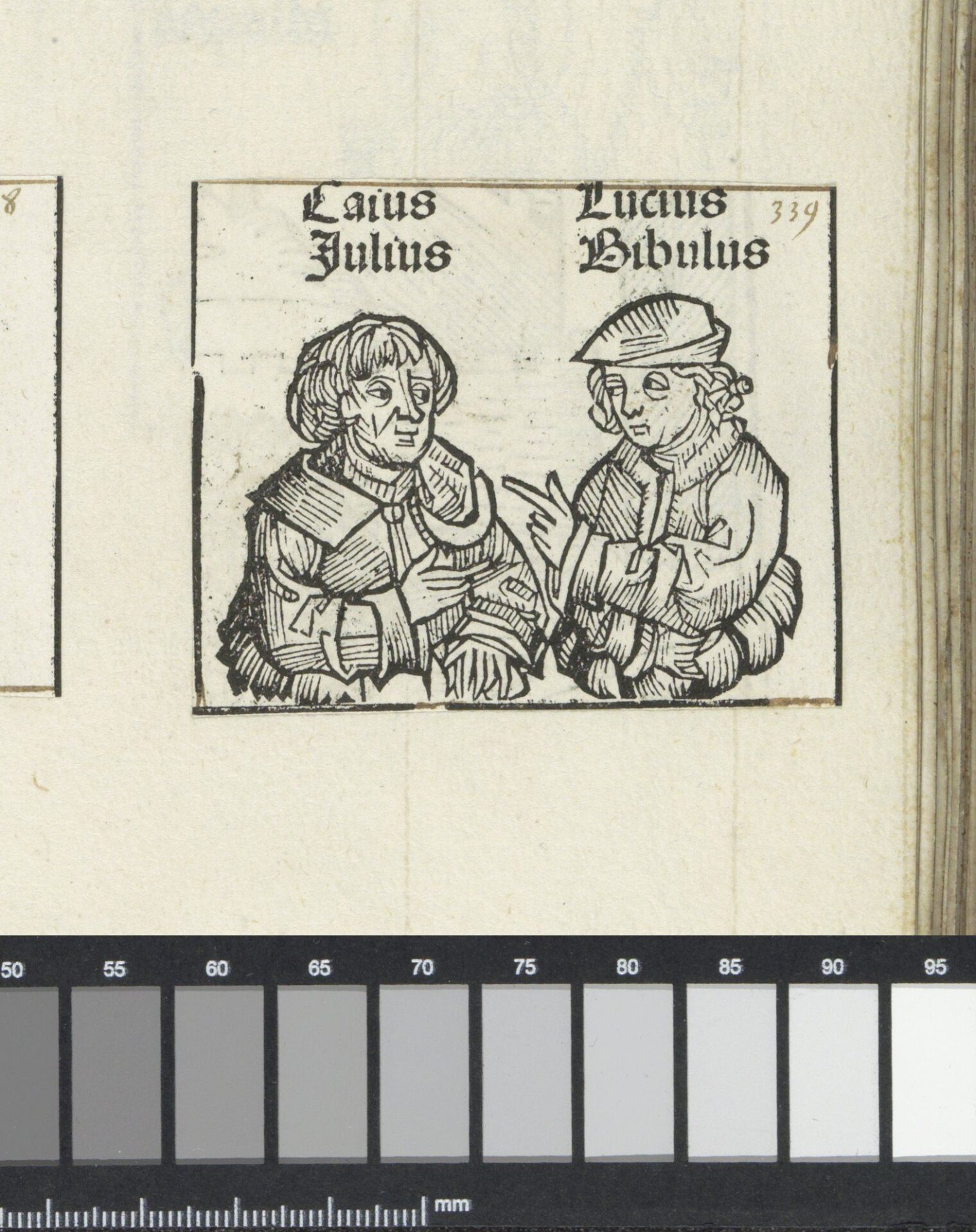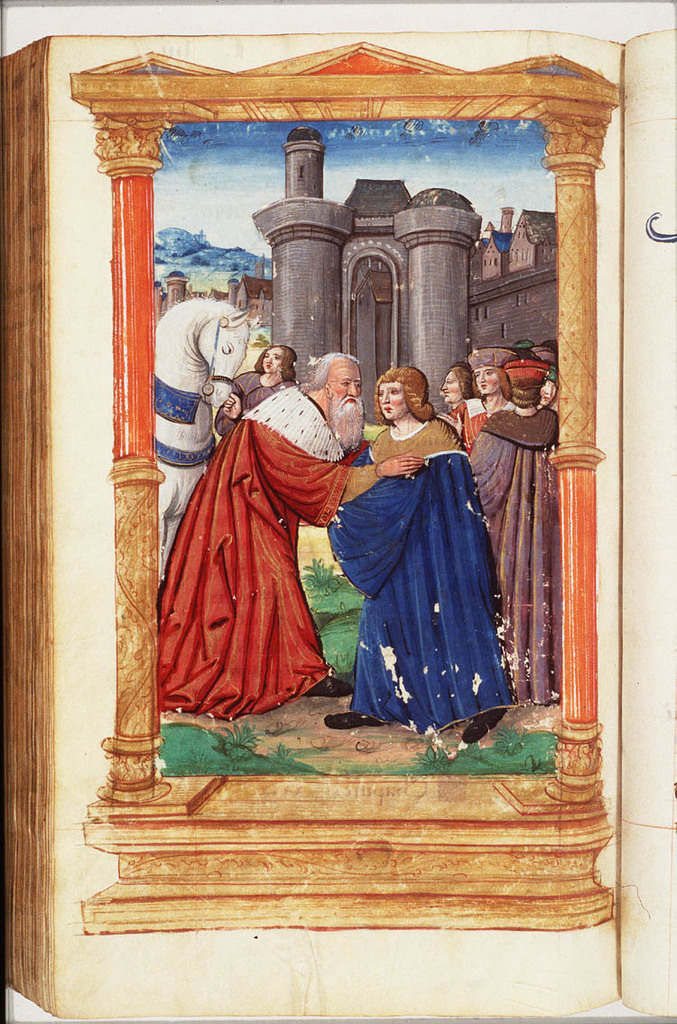Triumvirate – Reasons For the Alliance
Gnaeus Pompey returned from the East as a victor over Mithridates and at that time was the most influential person in Rome. However, as much as Pompey was celebrated, they were also afraid in Rome that he would repeat what Gaius Marius had done. Pompey did not do this, but immediately disbanded the army and placed his trust in the Senate and its decisions. His political goal was the acceptance of all the measures he had taken in the East. To his regret, there was opposition in Rome to his measures, led by Lucullus, who had personal disputes with Pompey.
In the Senate, there were proposals to discuss each law he passed in the East individually, and the Senate refused to confirm the most important legal measure passed by Pompey, which was the granting of land to the veterans of his campaigns who were thus left without a reward for their military victories. The attempt with the tribune Flavius on Pompey’s side ended ingloriously. Pompey needed help to win the legalization of his measures in the East, and he received an opportunity for an alliance in the form of Caesar, whose demands the Senate also did not want to fulfill.
Julius Caesar returned from Hispania a wealthy man and a celebrated military leader. His military successes in Spain were enough to ensure his triumph. Caesar’s problem with the Senate was that as a general he could not enter Rome before holding a triumph, and he wanted to run for consulship for the following year, so Caesar asked the Senate to run for consulship in his absence.
Cato, as Caesar’s enemy, tried to prevent this by any means, and after Caesar gained the support of a certain number of senators, Cato changed his approach and gave a full-day speech, consuming all the time planned for the Senate sessions so that Caesar’s request could not even be discussed. Caesar gave up celebrating the triumph and chose instead to run for consulship for 59 BC.

Caesar needed allies to rise up the ladder of the Roman Republic, and the ideal opportunity was the two most influential men in Rome, whom Caesar managed to reconcile and win over to common goals. Crassus’ reasons for forming the triumvirate are the least known. It is believed that he wanted to increase his power and wealth. Crassus certainly wanted to be appointed commander for a new campaign in the East, and for this he needed the support of influential figures such as Pompey and Caesar.
According to Appian, Pompey was dissatisfied with the Senate’s refusal to accept his measures in the East and approached Caesar, who had previously been in close relations with Crassus, which led to an alliance.
Other sources state that Caesar was the first to approach Pompey and offered him an alliance in the political stage. Pompey was abandoned by the Senate and had to accept the offer, and in this way the triumvirate – an alliance of three was established, which was initially secret in nature. The triumvirate was a kind of alliance of powerful individuals against the senatorial aristocracy, where each of the triumvirs supported the others in their desire to achieve their goals. As an addition to the deal, Pompey married Caesar’s daughter Julia in a political marriage that quickly became more than that.
Caesar tried to bring Cicero into the triumvirate, who refused to follow Caesar’s political line against the Senate. Later, Caesar tried in various ways to get closer to Cicero, but he was unsuccessful. Pompey brought the support of the army and fame to the alliance, Crassus brought wealth and the support of the cavalry, and Caesar brought the support of the remnants of Marius’ party and the plebs.
In addition to the implicit promise to help each other, the triumvirate also had specific goals. Crassus and Pompey were to support Caesar in the struggle for the magistracy of consuls, then Caesar as consul was to provide Crassus with command in the next war against the Parthians. Certainly, Caesar as consul in the Senate would have implemented Pompey’s measures in the East as well as the allocation of land to Pompey’s veterans. The triumvirate was not universally accepted, although it had its supporters. The writer Varro called this alliance a three-headed monster.
The Influence of the Triumvirate
Pompey was indeed the most influential of all the triumvirs, but Julius Caesar was still the ideological leader of this triumvirate and was the first to take advantage of this agreement when he was elected Consul for 59 BC together with Calpurnius Bibulus, who represented the opposition to the triumvirs.
When he was elected consul, Caesar worked to fulfill his part of the agreement and pass an agrarian law and confirm all the measures that Pompey had brought to the east. Along with taking care of Pompey’s veterans, Caesar also provided land for the poorest residents of the city through the agrarian law, which made Caesar’s popularity even greater.
Caesar did not have the support of his co-consul Bibulus and the Senate, in which Cato was the most influential, who could not speak against a well-prepared law, but spoke against Caesar, and then even resorted to obstruction. After unpleasant scenes in the Senate, Caesar renounced cooperation with this governing body and turned to the comitia for help, where during a session he publicly sought the support of his fellow triumvirs, with whose help and some use of force the agrarian law Lex Julia was finally passed in April 59 BC.

Cato and Bibulus were physically prevented from speaking against the law, and Bibulus then locked himself in his house for the rest of his term, justifying it by a bad omen.
By passing this law and the way it was passed, Caesar made it clear to the Senate that he renounced further cooperation with this body, which had lost its power again after a short-lived rise under Cicero. The Senate never recovered from this defeat and finally gave way to the rule of powerful individuals.
Caesar’s popularity after the passing of this law was at its peak, and he then tried to lure another opponent into his camp by offering Cicero a place on one of the commissions that distributed the allotted land, but Cicero rejected this offer from Caesar, which clearly convinced Caesar that he had to deal with him in another way.
After the successful entry into force of the law, Caesar further increased his popularity by passing some laws in favor of the equestrian class. The only opponents of Julius Caesar and the triumvirate remained Cicero and Cato, who had to be suppressed before leaving for Gaul, which he received, together with Illyricum, for a period of five years. Strictly adhering to his part of the agreement, Caesar increasingly emerged from Pompey’s shadow and became the most influential factor in Roman politics.
The Banishment of Cicero
Ever since the time of the trial against him, Claudius Pulcher had been on the side of Julius Caesar, and was a great enemy of Cicero, whom he hated. Claudius served as an ideal tool in removing Cicero from Roman politics, although Caesar’s involvement in this event has never been proven, since Caesar had already left Rome and was in his assigned provinces.
Claudius, as a tribune of the people, accused Cicero of illegally executing Roman citizens after the Catiline conspiracy. Cicero relied on the support of Pompey, who refused to side with him out of respect for Caesar or fear of Claudius. Cicero, who was eloquent in the disputes of others, proved to be very weak this time, and although he asked for help from everyone, no one came to help him.
Caesar advised Cicero to leave Rome and come to Gaul, where he would be appointed to a military position in Caesar’s army, which made Caesar make another attempt to lure Cicero to his side, but Cicero refused. Cicero, after his trial in March 58 BC, went into exile, as the strongest defender of the Senate’s power from the political life of Rome.
His exile was not well received, and the senators dressed in black togas in protest, which was later forbidden. Claudius succeeded in getting a vote passed that Cicero could not approach Rome within 500 miles, and in doing so, he plundered his property, demolished his house, and on that site he had ordered a temple to be built.
However, Claudius could not find a buyer for Cicero’s property. Cicero first went to Sicily, where he was not allowed to stay, and then continued to Greece, where he settled. Another great opponent of the triumvirate, Cato, was also removed by being entrusted with a state mission in Cyprus, as well as overseeing the return of refugees to Byzantium.
Cato could not refuse, as it would be considered treason. Despite these acts, which were considered to be from Caesar, his popularity among the plebs did not suffer a great decline, especially since Claudius also passed a law on the free distribution of grain to Roman citizens.
Rome in a State of Anarchy
After the banishment of Cicero, Claudius learned that violence and physical force dominate words in Roman politics and began to behave accordingly. He ceased to be Caesar’s supporter and became a factor in Roman politics himself, which was certainly made easier for him by the fact that Caesar was in Gaul, while Pompey acted passively in anticipation of further events. With the help of his armed gangs, Claudius established control over the streets of the city and silenced his critics, but in the long run he incurred the wrath of all the important figures in the political life of the republic.
Claudius felt so powerful that he began to work against powerful men such as Pompey, whose measures in the East he wanted to abolish, and Caesar, whose laws he also wanted to challenge. Pompey soon began to work with the Senate to return Cicero, while Caesar, although well informed in Gaul, allowed the establishment of rival armed gangs under the command of the popular tribune Milo.
When Claudius convened an assembly to annul the laws that Caesar had introduced with the help of Bibulus, the assembly turned against him and voted the illegality of Claudius’s adoption into the plebeian race so that he no longer had the right to be a tribune of the people, but he continued to fight for his goals with arms.
After much turmoil during the year 57 BC, Pompey personally read before the Senate a proposal for the return of Cicero, which was voted with only one vote against, Claudius’s. Pompey, who increasingly began to turn to cooperation with the Senate, managed to return Cicero from exile after sixteen months, although he indirectly participated in his expulsion from Rome. Cicero’s house was rebuilt at state expense and he returned to Rome in triumph on September 4, 57. Pompey had mistakenly assumed that Senate rule would return to Rome after Cicero’s return, but that time had long passed.

The situation in the city was no longer under control, Cicero did not abandon the republican laws, while Claudius was waging violent personal riots against his growing number of enemies in the streets of Rome. Crassus remained on the sidelines, waiting to lead an attack on the east, and Pompey was unsuccessfully trying to present himself as a defender of the law by approaching the Senate. In the anarchy of the city of Rome, only Caesar became stronger with his great conquests in Gaul, and his military glory was equal to Pompey’s, although he had his eye on events in Rome all the time.
Sources and Literature:
Appianus, of Alexandria. (1902). Appianou Romaikon Emphylion A = Appian, Civil Wars, book I. Oxford: Clarendon Press,
Morey, W. C. (1900). Outlines of Roman history: For the Use of High Schools and Academies.
Beard, M. (2015). SPQR: A History of Ancient Rome.
Cicero, M. T. (2020). Brutus: And, Orator.
Suetonius, approximately 69-approximately 122. (1883). The lives of the twelve Caesars. New York: R. Worthington,
Plutarch. (1859). Plutarch’s Lives: translated from the original Greek, with notes, critical and historical, and life of Plutarch. New York: Derby & Jackson,
Hello, my name is Vladimir, and I am a part of the Roman-empire writing team.
I am a historian, and history is an integral part of my life.
To be honest, while I was in school, I didn’t like history so how did I end up studying it? Well, for that, I have to thank history-based strategy PC games. Thank you so much, Europa Universalis IV, and thank you, Medieval Total War.
Since games made me fall in love with history, I completed bachelor studies at Filozofski Fakultet Niš, a part of the University of Niš. My bachelor’s thesis was about Julis Caesar. Soon, I completed my master’s studies at the same university.
For years now, I have been working as a teacher in a local elementary school, but my passion for writing isn’t fulfilled, so I decided to pursue that ambition online. There were a few gigs, but most of them were not history-related.
Then I stumbled upon roman-empire.com, and now I am a part of something bigger. No, I am not a part of the ancient Roman Empire but of a creative writing team where I have the freedom to write about whatever I want. Yes, even about Star Wars. Stay tuned for that.
Anyway, I am better at writing about Rome than writing about me. But if you would like to contact me for any reason, you can do it at contact@roman-empire.net. Except for negative reviews, of course. 😀
Kind regards,
Vladimir
